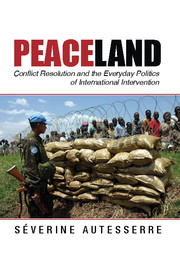Book contents
- Frontmatter
- Contents
- Figure and Tables
- Acknowledgments
- Introduction
- 1 Studying the Everyday
- Part I Constructing Knowledge of the Host Country
- Part II Constructing and Maintaining Boundaries
- 5 The Interveners’ Circle
- 6 A Structure of Inequality
- 7 Daily Work Routines
- Conclusion Transforming Peaceland
- Appendix An Ethnographic Approach
- Bibliography
- Index
- References
Conclusion - Transforming Peaceland
Published online by Cambridge University Press: 05 July 2014
- Frontmatter
- Contents
- Figure and Tables
- Acknowledgments
- Introduction
- 1 Studying the Everyday
- Part I Constructing Knowledge of the Host Country
- Part II Constructing and Maintaining Boundaries
- 5 The Interveners’ Circle
- 6 A Structure of Inequality
- 7 Daily Work Routines
- Conclusion Transforming Peaceland
- Appendix An Ethnographic Approach
- Bibliography
- Index
- References
Summary
Every morning, when Véronique arrived at the office of the Congolese human rights agency where she volunteered, Deo, the janitor, would be hard at work scrubbing the floor. Half an hour later, one of the Congolese lawyers would come in and see the young man cleaning. Every time, the passing lawyer would kick Deo’s bucket of water over, forcing him to start scrubbing all over again. Every senior member of the office participated in this routine, so that whoever arrived first and saw Deo finishing his work would carry out the ritual of kicking over the bucket. Véronique was outraged. She was also puzzled: Why did the young man not protest? Above all, how could lawyers dedicated to the defense of human rights behave this way? Her first reaction was to put an end to the injustice (as most other expatriate interveners would have done). Then, Véronique stopped herself. She was a newcomer to Peaceland. She had just arrived in Congo, and she did not know the culture there. Her husband came from a developing country, and he had seen firsthand the problems that well-meaning interveners who knew little of local conditions could create. That, plus Véronique’s extensive interactions with other cultures in her previous professional life, had made her wary of using her own Franco-Swiss frame of reference to judge the practices of others. Besides, as a subordinate of the organization’s Congolese leadership, she had an unusually low rank for an expatriate, which deprived her of the power and legitimacy to sanction her colleagues. So, instead, she waited.
- Type
- Chapter
- Information
- PeacelandConflict Resolution and the Everyday Politics of International Intervention, pp. 247 - 274Publisher: Cambridge University PressPrint publication year: 2014



